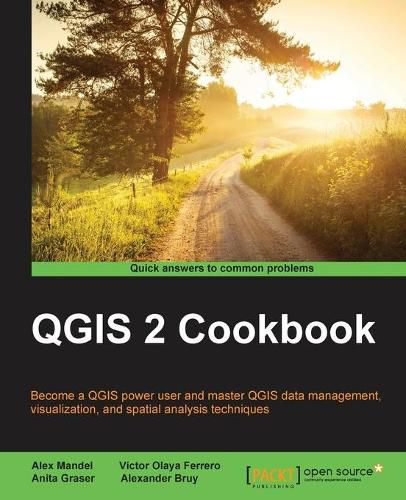Readings Newsletter
Become a Readings Member to make your shopping experience even easier.
Sign in or sign up for free!
You’re not far away from qualifying for FREE standard shipping within Australia
You’ve qualified for FREE standard shipping within Australia
The cart is loading…






This title is printed to order. This book may have been self-published. If so, we cannot guarantee the quality of the content. In the main most books will have gone through the editing process however some may not. We therefore suggest that you be aware of this before ordering this book. If in doubt check either the author or publisher’s details as we are unable to accept any returns unless they are faulty. Please contact us if you have any questions.
Become a QGIS power user and master QGIS data management, visualization, and spatial analysis techniques
About This Book
* Explore and create time-based visualizations and build interactive maps * Maximize your use of the QGIS features, plugins and toolbox automation * Packed with lots of sample datasets to enable a better understanding of the code
Who This Book Is For
If you are an intermediate GIS user, with either previous experience in QGIS or any other GIS application, this is the book for you. The recipes can be used to learn more advanced techniques in QGIS or to replicate the functionalities equivalent to other GIS platforms. This book assumes that you already have a working QGIS system in place.
What You Will Learn
* Import and export common tricky spatial data formats * Perform classic vector and raster analysis with QGIS * Utilize spatial databases and data management tools * Use and create geographic web services and maps * Explore and create time-based visualizations * Perform network building and routing analysis * Extend QGIS capabilities with popular plugins and toolbox automation * Make beautiful and unique maps with customized cartography
In Detail
QGIS is a user-friendly, cross-platform desktop geographic information system used to make maps and analyze spatial data. QGIS allows users to understand, question, interpret, and visualize spatial data in many ways that reveal relationships, patterns, and trends in the form of maps. This book is a collection of simple to advanced techniques that are needed in everyday geospatial work, and shows how to accomplish them with QGIS. You will begin by understanding the different types of data management techniques, as well as how data exploration works. You will then learn how to perform classic vector and raster analysis with QGIS, apart from creating time-based visualizations. Finally, you will learn how to create interactive and visually appealing maps with custom cartography. By the end of this book, you will have all the necessary knowledge to handle spatial data management, exploration, and visualization tasks in QGIS.
Style and approach
This book covers practical examples, with step-by-step instructions on how to use real world data covering common GIS operations and the different analysis techniques. It provides detailed explanations and applications of QGIS concepts that will allow the user to effectively analyze spatial data.
$9.00 standard shipping within Australia
FREE standard shipping within Australia for orders over $100.00
Express & International shipping calculated at checkout
This title is printed to order. This book may have been self-published. If so, we cannot guarantee the quality of the content. In the main most books will have gone through the editing process however some may not. We therefore suggest that you be aware of this before ordering this book. If in doubt check either the author or publisher’s details as we are unable to accept any returns unless they are faulty. Please contact us if you have any questions.
Become a QGIS power user and master QGIS data management, visualization, and spatial analysis techniques
About This Book
* Explore and create time-based visualizations and build interactive maps * Maximize your use of the QGIS features, plugins and toolbox automation * Packed with lots of sample datasets to enable a better understanding of the code
Who This Book Is For
If you are an intermediate GIS user, with either previous experience in QGIS or any other GIS application, this is the book for you. The recipes can be used to learn more advanced techniques in QGIS or to replicate the functionalities equivalent to other GIS platforms. This book assumes that you already have a working QGIS system in place.
What You Will Learn
* Import and export common tricky spatial data formats * Perform classic vector and raster analysis with QGIS * Utilize spatial databases and data management tools * Use and create geographic web services and maps * Explore and create time-based visualizations * Perform network building and routing analysis * Extend QGIS capabilities with popular plugins and toolbox automation * Make beautiful and unique maps with customized cartography
In Detail
QGIS is a user-friendly, cross-platform desktop geographic information system used to make maps and analyze spatial data. QGIS allows users to understand, question, interpret, and visualize spatial data in many ways that reveal relationships, patterns, and trends in the form of maps. This book is a collection of simple to advanced techniques that are needed in everyday geospatial work, and shows how to accomplish them with QGIS. You will begin by understanding the different types of data management techniques, as well as how data exploration works. You will then learn how to perform classic vector and raster analysis with QGIS, apart from creating time-based visualizations. Finally, you will learn how to create interactive and visually appealing maps with custom cartography. By the end of this book, you will have all the necessary knowledge to handle spatial data management, exploration, and visualization tasks in QGIS.
Style and approach
This book covers practical examples, with step-by-step instructions on how to use real world data covering common GIS operations and the different analysis techniques. It provides detailed explanations and applications of QGIS concepts that will allow the user to effectively analyze spatial data.